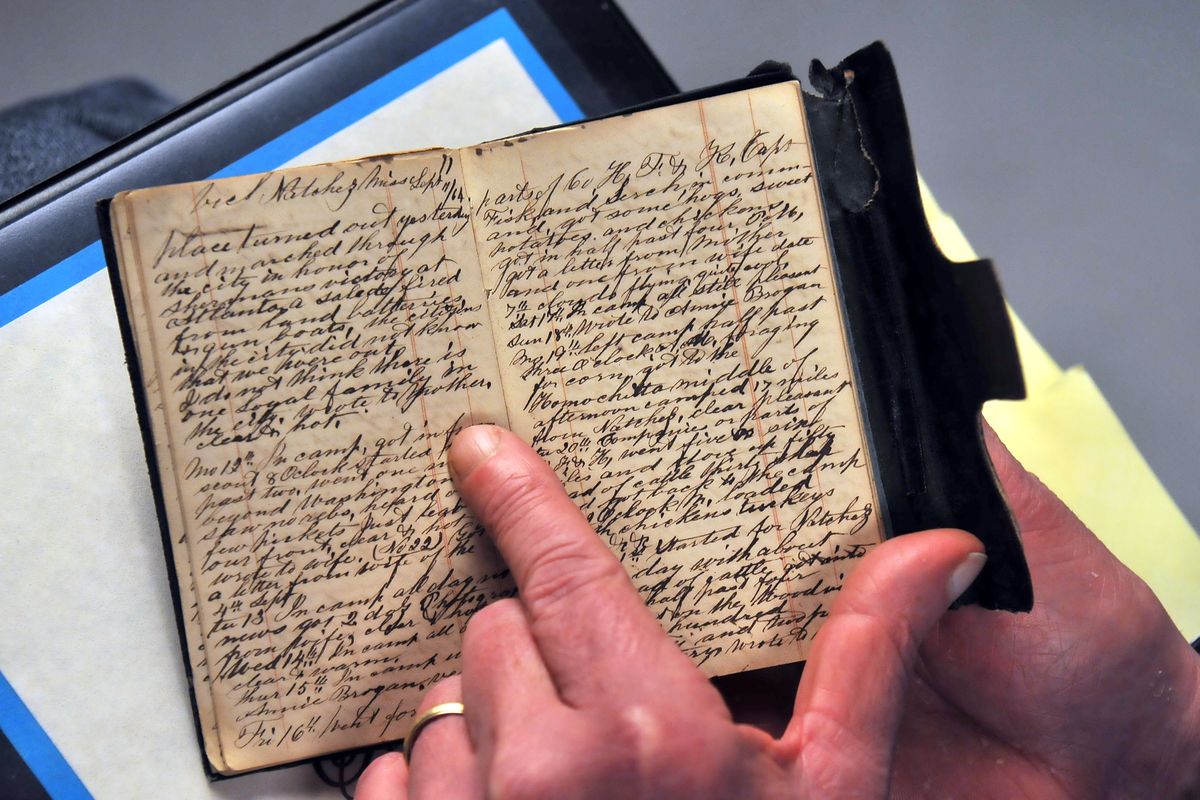Civil War, one soldier’s take
Discovered diary shows struggles close-up

John Beam was helping clean out his late father’s possessions last fall when he found an old envelope at the back of a pajama drawer.
Inside were documents and a small, leather-bound diary kept by his great-great uncle during the last years of the Civil War.
“I was beside myself,” the Spokane resident said. “It’s just full of historical stuff.”
Today marks the 150th anniversary of the war’s start, when Confederate forces fired on a Union garrison at Fort Sumter in South Carolina.
Beam’s ancestor, Peter Simon String – he went by Simon – was mustered into Company H of the 4th Illinois Cavalry from his home in Springfield, Ill., and became part of the western Army of the Tennessee, serving as a first sergeant under Gen. Ulysses S. Grant.
String saw action at Shiloh, Fort Henry and Vicksburg, among other battles, and was part of General William Tecumseh Sherman’s march to the sea.
“These guys marched mile after mile in the mud and freezing cold,” Beam said. “They were tough people.”
The diary weighs less than 2 ounces and is in relatively good condition despite its yellowing pages. String’s handwriting is excellent but very small.
The entries give a day-to-day description of the action, alternating from bloody fights to foraging for food.
It conveys an image of a serious, efficient and educated man who was devoted to his wife and cause. At one point he mildly criticizes soldiers for getting drunk.
Wednesday, Dec. 7, 1864:
“… Left Natchez at 4 p.m. A great many of the battalion drunk. A very disappointful affair, reflecting on the ability of officers commanding.”
Monday, Jan. 2, 1865:
“Marched at daylight, the other 2 brigades some 15 miles to the right of us. We were attacked at Franklin by 800 men. We drove them ¾ of a mile after a stubborn fight, killing and wounding many.”
Friday, Feb. 10, 1865:
Marched at 5 a.m., had prisoners in charge, crossed Bayou Mason at 12, marched to river Gaines Landing and camped. Three miles of swamp, very muddy, turned over prisoners to guard on boat, clear, warm.”
Tuesday, Feb. 21, 1865:
“In camp, turned my tent facing southeast & ditched around it. Cloudy and warm.”
Inside the diary, Beam found photographs of String; String’s wife, Elizabeth Beam String; and President Abraham Lincoln.
When news arrived in camp confirming Lincoln’s re-election in 1864, String wrote, “Old ‘Abe’ elected without a doubt, Thank God for that, now howl you copperhead traitors,” the latter term a reference to Democrats who favored a negotiated settlement with the South.
Of the 1,100 men in the 4th Illinois at the start of the war, only 340 survived to November 1864, Beam said.
“He talks about people being shot right next to him,” he said.
String left the Army as a second lieutenant and returned to Springfield about six weeks after the war ended. “Am a citizen. War labors are now over,” he wrote in the last entry.
Beam, who lives on the North Side, transcribed the text of the diary and turned over a copy to the Lincoln Library in Springfield. He donated several original documents belonging to String that were with the diary. Beam also has buttons off String’s uniform.
String died in 1921 at age 90, outliving his wife and daughter. He was buried a short distance from Lincoln’s tomb in Springfield.
The diary was given to Beam’s grandmother, a niece of String. She died in 1965, and the diary passed to Beam’s father, John C. Beam III, who died in 1988.
For more than 40 years, the diary had been left untouched by Beam’s mother, who is now 98 and ailing. Beam, who pursues genealogy as a hobby, checked his great-great uncle’s entries against historical records. “Everything matches,” he said.
Beam believes the diary adds local details to the already voluminous documentation of the Civil War. Its discovery left him wanting more.
“I would have given anything to meet him,” he said.